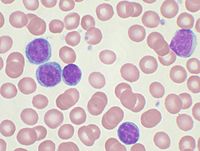
Photo from wikipedia
The aim of this study was to develop casein-based nanoscale carriers as a potential delivery system for daunorubicin, as a pH-responsive targeting tool for acute lymphocytic leukemia. A coacervation technique… Click to show full abstract
The aim of this study was to develop casein-based nanoscale carriers as a potential delivery system for daunorubicin, as a pH-responsive targeting tool for acute lymphocytic leukemia. A coacervation technique followed by nano spray-drying was used for the preparation of drug-loaded casein nanoparticles. Four batches of drug-loaded formulations were developed at varied drug–polymer ratios using a simple coacervation technique followed by spray-drying. They were further characterized using scanning electron microscopy, dynamic light scattering, FTIR spectroscopy, XRD diffractometry, and differential scanning calorimetry. Drug release was investigated in different media (pH 5 and 7.4). The cytotoxicity of the daunorubicin-loaded nanoparticles was compared to that of the pure drug. The influence of the polymer-to-drug ratio on the nanoparticles’ properties such as their particle size, surface morphology, production yield, drug loading, entrapment efficiency, and drug release behavior was studied. Furthermore, the cytotoxicity of the drug-loaded nanoparticles was investigated confirming their potential as carriers for daunorubicin delivery.
Journal Title: Pharmaceutics
Year Published: 2023
Link to full text (if available)
Share on Social Media: Sign Up to like & get
recommendations!